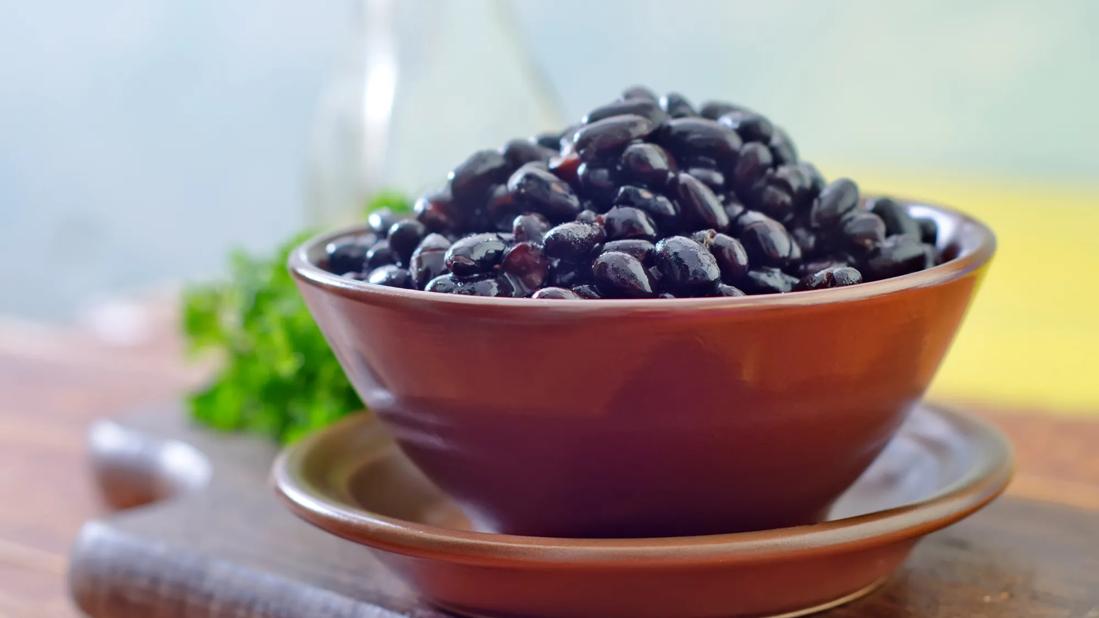Black beans are bursting with nutrients that help reduce cancer risk, improve heart health, aid digestion and fight inflammation

Black beans, a member of the legume family that includes other beans, peas and lentils, are a staple food in many cultures. Native to Central and South America, these dark beans are also known as turtle beans or frijoles negros. Despite the name, the skin of the black bean is actually a very deep purple.
Advertisement
Cleveland Clinic is a non-profit academic medical center. Advertising on our site helps support our mission. We do not endorse non-Cleveland Clinic products or services. Policy
“Like most legumes, black beans are versatile and inexpensive,” says registered dietitian Natalie Romito, RD, LD. “They shine in many types of dishes, and they’re great hot or cold. They also offer several health benefits.”
Romito shares why black beans should become a regular part of your meal plan.
“Black beans contain lots of soluble and insoluble fiber,” Romito says. “They’re an excellent source of plant protein, offering 15 grams of protein per cup cooked (30% daily value, or DV) and many other essential nutrients.”
One cup of cooked black beans also provides:
“We sometimes overlook legumes when we talk about superfoods,” Romito says. “But black beans offer noteworthy disease-fighting power.”
She describes four impressive health benefits of black beans:
Black beans are full of antioxidants. “These chemicals fight the damage caused by free radical molecules,” Romito says. “Too many free radicals in your body can cause your cells to age quicker and contribute to many serious conditions.”
Advertisement
Black beans contain several antioxidants, including anthocyanin and quercetin. Getting enough antioxidants in your diet helps keep your organs healthy and happy.
A higher intake of antioxidant-rich foods like black beans lowers your risk of:
“Black beans contain several nutrients, such as vitamins, minerals and phytochemicals. They work together to benefit inflammation, detoxification and cell health. All of this helps lower your cancer risk,” Romito shares.
Highlights some of the cancer-fighting nutrients in black beans include:
“Black beans are a gold mine of nutrients for your gut,” Romito notes. “Not many individual foods have as many digestive benefits as black beans.”
Black beans help your gut by providing:
Black beans are an excellent addition to a heart-healthy diet. Nutrients in black beans that lower your risk of cardiovascular disease include:
Advertisement
And if heart health is your goal, Romito recommends looking for “low-sodium” or “no salt added” options when choosing canned beans.
As with any type of bean, black beans can cause some uncomfortable or downright embarrassing bloating and gas. “You may avoid beans because of their gas-inducing effects,” Romito says. “However, many people can tolerate beans well if they start small. You might have to eat just a few beans at first. But if you eat them consistently over time, your digestive system will tolerate them better.”
You can make dry black beans easier to digest by:
Romito also recommends boiling your black beans on the stove or cooking them in a pressure cooker, not in a slower cooker or crock pot. This is because slow cookers and crock pots don’t get hot enough to eliminate the lectins in black beans, which are a major culprit of those unwanted GI side effects.
And if you’re using canned beans, rinsing them as well can help reduce gas and bloating.
Whether you buy them dry or canned, black beans make a great base or addition to all sorts of dishes. (Again, if you’re using canned beans, drain and rinse them first to get rid of some of the excess salt.)
Advertisement
Here are just a few ways you can enjoy black beans:
“There’s almost no limit to what you can do with black beans,” Romito enthuses. “Their flavor is mild enough to blend well with most types of dishes and cuisines.”
And if you’re ready to go all in with this legume, make these flourless, good-for-you black bean brownies for a sweet, healthy treat.
Advertisement

Sign up for our Health Essentials emails for expert guidance on nutrition, fitness, sleep, skin care and more.
Learn more about our editorial process.
Advertisement

The tropical fruit is a good source of antioxidants and vitamin C

High amounts of cholesterol and saturated fat in red meat may be linked to heart disease

The leaves and pods from this tree are rich in essential nutrients

This starchy root vegetable is a staple in many global cuisines — but it has to be prepared correctly, or it can cause serious concerns

These delicate green sprouts can give you an extra dose of vitamin K and other nutrients — but they’re not safe for everyone

Edamame, lentils and chicken breast are good sources of protein

Eating this root vegetable can help support your eye, heart and brain health

The flavorful herb is full of antioxidants that may help regulate blood sugar

Even small moments of time outdoors can help reduce stress, boost mood and restore a sense of calm

A correct prescription helps your eyes see clearly — but as natural changes occur, you may need stronger or different eyeglasses

Both are medical emergencies, but they are very distinct events with different causes